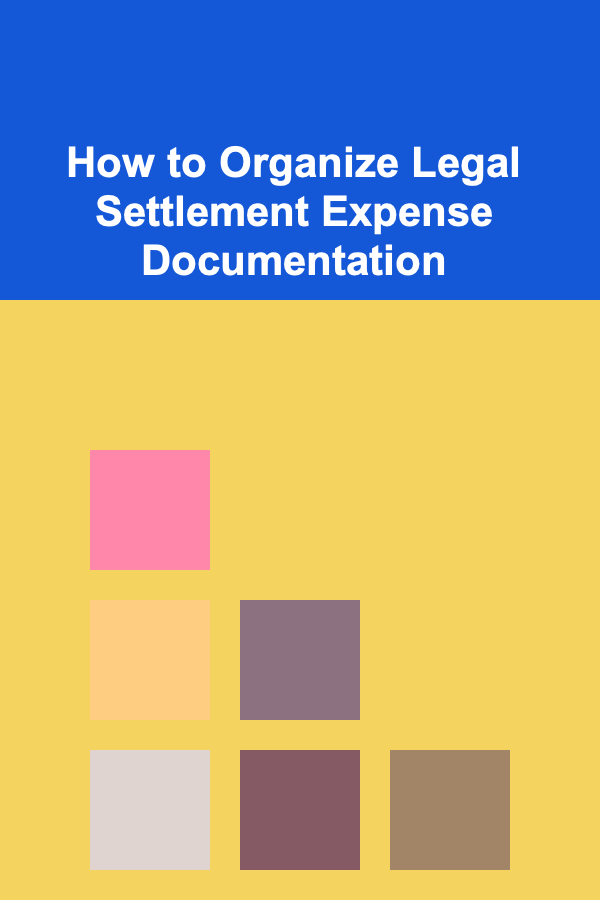
How to Organize Legal Settlement Expense Documentation
ebook include PDF & Audio bundle (Micro Guide)
$12.99$7.99
Limited Time Offer! Order within the next:

Legal settlements often involve numerous financial transactions, and properly documenting and organizing these expenses is essential for clarity, tax reporting, and future reference. Whether you're an individual involved in a settlement or a business handling multiple claims, having an organized system for managing settlement expenses can streamline the process, reduce errors, and ensure compliance with applicable regulations.
This guide will outline the best practices for organizing legal settlement expense documentation, covering everything from understanding what counts as a legal expense to how to create a system for tracking, categorizing, and storing documents. Let's dive into the process of effectively organizing legal settlement expense documentation.
Understanding Legal Settlement Expenses
Legal settlement expenses encompass a wide range of costs that can arise during the course of a legal dispute and its resolution. These expenses can vary greatly depending on the nature of the settlement, the parties involved, and the legal framework governing the dispute.
Types of Settlement Expenses:
- Attorney Fees: This includes any amounts paid for legal services. Typically, attorney fees can be categorized into hourly rates, flat fees, contingency fees, or retainers.
- Court Costs: These may include filing fees, administrative fees, and other charges incurred by the court system.
- Expert Witness Fees: Costs associated with hiring expert witnesses to provide testimony or analysis.
- Investigative Costs: Any expenses related to investigation, such as private investigators or discovery-related expenses.
- Settlement Payments: The actual amount paid to the opposing party or parties to settle the case, which could be a lump sum or structured payment plan.
- Miscellaneous Legal Expenses: Other related costs such as travel, accommodation, and document production.
Organizing these expenses requires recognizing the categories of costs and understanding how each impacts the overall settlement process.
Setting Up an Organized System for Documentation
Efficient organization begins with setting up a robust system to track and manage all settlement-related documentation. Without a consistent system, critical information can easily be lost or overlooked, leading to potential errors, missed deductions, or disputes.
Steps for Setting Up Your System:
-
Create a Master List of All Settlement Expenses Start by creating a detailed list of all expenses related to the legal settlement. This list should include the type of expense, the date it was incurred, the amount, and the entity or person paid. You can do this in a spreadsheet, accounting software, or a physical ledger if preferred.
-
Categorize Expenses Categorize your expenses based on their nature. Common categories include:
- Legal fees
- Court-related costs
- Settlement payments
- Travel expenses
- Expert fees
- Miscellaneous costs
This categorization will make it easier to track your expenses, identify areas where costs can be minimized in future settlements, and ensure proper accounting.
-
Utilize Software Tools Consider using accounting or project management software to track expenses. Tools such as QuickBooks, Xero, or even more specialized legal management software can automate much of the process, track receipts, and even generate reports. Spreadsheets like Excel or Google Sheets can also be used for simple tracking and categorization.
-
Establish Clear Filing Systems A filing system for both physical and electronic documents is essential. Whether you prefer physical files or digital records, having a systematic approach is key. For digital records:
- Use cloud storage services such as Google Drive, Dropbox, or OneDrive for easy access and backup.
- Create separate folders for each category (e.g., "Legal Fees," "Court Costs," etc.), and subfolders for each individual case or settlement.
- Use a consistent naming convention for files to ensure easy retrieval (e.g., "Settlement Payment - March 2025").
For physical records:
- Use labeled folders, binders, or file cabinets, and organize documents in a similar way to your digital system.
- Always ensure that original documents are kept in a secure location.
Collecting and Storing Supporting Documentation
Properly storing supporting documents is one of the most important aspects of organizing legal settlement expense documentation. These documents provide the evidence necessary to substantiate your claims and protect against future disputes.
Key Documents to Collect:
- Invoices and Receipts: All receipts from vendors or service providers, including legal services, expert fees, court costs, and miscellaneous expenses. Make sure each document is itemized.
- Settlement Agreement: A copy of the signed settlement agreement, outlining all financial terms, payment schedules, and other important details.
- Correspondence: Any emails, letters, or other communication that outlines or confirms costs, payments, or settlement terms.
- Payment Confirmations: Proof of payments made toward the settlement (e.g., wire transfers, checks, receipts).
- Court Documents: Any filings, orders, or judgments related to the case that might involve expenses or reimbursement.
It's crucial to maintain these documents in an organized fashion. Consider using a digital document management system that offers the ability to tag and search documents by keyword for easy retrieval.
Tracking Payments and Expenses
Effective tracking of all payments and expenses throughout the settlement process is essential for avoiding discrepancies and ensuring all costs are properly accounted for.
Tips for Tracking:
- Record Every Payment: Keep a record of every payment made, whether it's an attorney fee, court cost, or expert witness fee. It's easy to overlook small amounts that can add up over time.
- Maintain Payment Schedules: If your settlement involves structured payments, keep a detailed schedule of when payments are due and when they've been made. This can prevent missed deadlines and ensure that all payments are properly documented.
- Use Accounting Software: If you are handling numerous expenses, using accounting software like QuickBooks can simplify the process. You can link payments directly to specific categories and generate reports for easier tracking and auditing.
- Reconcile Regularly: Frequently reconcile your records against bank statements or payment confirmations to ensure accuracy.
Ensuring Compliance with Tax Regulations
Legal settlement expenses are often subject to specific tax regulations, and it's critical to organize documentation in a way that makes it easy to comply with tax laws. Different expenses may be deductible or non-deductible, and some may need to be reported on specific tax forms.
Key Considerations:
- Tax Deductions: Many legal expenses, such as attorney fees, may be deductible depending on the nature of the case (e.g., business-related litigation). Consult with a tax advisor to understand what expenses qualify for deductions.
- Reporting Payments: Ensure that all settlement payments and other related expenses are documented clearly for tax reporting purposes. This is especially important for cases where settlement payments are structured over time.
- Consult a Tax Professional: Given the complexity of legal settlement taxation, it's always a good idea to work with a tax professional or CPA who can help ensure your documentation complies with relevant tax regulations.
Creating Reports for Audits or Legal Review
Having detailed reports on your legal settlement expenses is critical in case of an audit or if any of the expenses are challenged in the future. Reports should include all relevant expenses, categorized by type, and show how the funds were allocated or paid.
Report Preparation Steps:
- Compile a Summary: Create a summary of all expenses by category and total them for quick reference. This will provide a high-level overview of the financial aspects of the settlement.
- Detailed Transaction Records: Maintain detailed records of every transaction, including dates, amounts, payees, and purpose. These records should be easily accessible for review.
- Generate Financial Reports: If using accounting software, generate reports that show itemized expenses, income, and remaining balances. These reports are helpful for both tax reporting and future audits.
Maintaining Ongoing Organization and Security
As time passes, it's important to continue maintaining your records in a secure and organized manner, especially as some settlements may stretch over several years or involve payments that extend into the future.
Ongoing Maintenance Tips:
- Periodic Reviews: Regularly review and update your records to ensure that all payments are accounted for and no documents are missing.
- Data Security: Ensure that both digital and physical records are stored securely. For digital records, use encryption and secure cloud storage. For physical records, use lockboxes or filing cabinets with restricted access.
- Backups: Create backups of digital documents to prevent data loss, and regularly update these backups.
Conclusion
Properly organizing and documenting legal settlement expenses is essential for ensuring financial accuracy, tax compliance, and dispute resolution. By following the steps outlined in this guide, you can create a structured, secure system for tracking, categorizing, and storing your settlement-related documents. This not only simplifies the management of your legal expenses but also provides peace of mind knowing that your financial records are thorough, accurate, and easy to access when needed.
Reading More From Our Other Websites
- [Home Maintenance 101] How to Properly Clean and Maintain Your HVAC System
- [Personal Care Tips 101] How to Implement a Sun Care Routine to Protect Your Skin Year-Round
- [Home Security 101] How to Maximize the Features of Your Smart Doorbell for Better Security
- [Ziplining Tip 101] A Beginner's Guide: Choosing the Right Ziplining Gloves for Your First Adventure
- [Home Renovating 101] How to Maximize Outdoor Living Space Through Renovation
- [Organization Tip 101] How to Use Clear Containers for Craft Supply Visibility
- [Home Space Saving 101] How to Save Space in Your Home with Decluttering Tips
- [Home Lighting 101] How to Light Your Home on a Budget Without Sacrificing Style
- [Organization Tip 101] What Are the Best Storage Solutions for Under-Bed Space?
- [Screen Printing Tip 101] Common Challenges in Metal Screen Printing---and How to Overcome Them

How to Choose the Right Bathroom Fixtures
Read More
How to Create a Farmhouse Look Without the Price Tag
Read More
How to Save Money on Groceries Without Cutting Quality
Read More
How to Rebrand Your Business Effectively
Read More
How To Practice Unit Testing for Robust Code
Read More
How to Grocery Shop for a Family of 6: A Comprehensive To-Do List
Read MoreOther Products

How to Choose the Right Bathroom Fixtures
Read More
How to Create a Farmhouse Look Without the Price Tag
Read More
How to Save Money on Groceries Without Cutting Quality
Read More
How to Rebrand Your Business Effectively
Read More
How To Practice Unit Testing for Robust Code
Read More